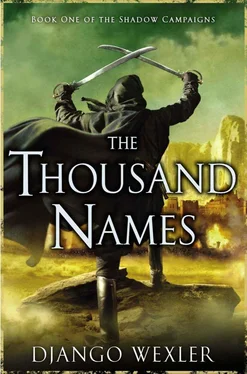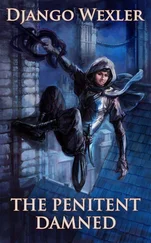Django Wexler - The Thousand Names
Здесь есть возможность читать онлайн «Django Wexler - The Thousand Names» весь текст электронной книги совершенно бесплатно (целиком полную версию без сокращений). В некоторых случаях можно слушать аудио, скачать через торрент в формате fb2 и присутствует краткое содержание. Жанр: Фэнтези, на английском языке. Описание произведения, (предисловие) а так же отзывы посетителей доступны на портале библиотеки ЛибКат.
- Название:The Thousand Names
- Автор:
- Жанр:
- Год:неизвестен
- ISBN:нет данных
- Рейтинг книги:4 / 5. Голосов: 1
-
Избранное:Добавить в избранное
- Отзывы:
-
Ваша оценка:
- 80
- 1
- 2
- 3
- 4
- 5
The Thousand Names: краткое содержание, описание и аннотация
Предлагаем к чтению аннотацию, описание, краткое содержание или предисловие (зависит от того, что написал сам автор книги «The Thousand Names»). Если вы не нашли необходимую информацию о книге — напишите в комментариях, мы постараемся отыскать её.
The Thousand Names — читать онлайн бесплатно полную книгу (весь текст) целиком
Ниже представлен текст книги, разбитый по страницам. Система сохранения места последней прочитанной страницы, позволяет с удобством читать онлайн бесплатно книгу «The Thousand Names», без необходимости каждый раз заново искать на чём Вы остановились. Поставьте закладку, и сможете в любой момент перейти на страницу, на которой закончили чтение.
Интервал:
Закладка:
The men themselves were different, too. It was harder to distinguish between the recruits and the Old Colonials: the new soldiers had lost their fish-belly pallor, and their kit had acquired the patina of dirt and hard wear that marked an army on the march, while the veterans had repaired some of the more obvious shabbiness to make sure they looked better than their younger companions. Strings of cavalry remounts, another thing Marcus had insisted on, walked in riderless lines behind the wagons, while Give-Em-Hell and his troopers were spread in a thin screen around the marching column.
Toward the end came the hospital wagons. Despite his promises to Fitz, Marcus had allowed a few of the very worst stricken to remain behind, those whom the cutters had quietly promised him didn’t have long to live in any case. Subjecting dying men to vicious jouncing along rutted roads in unsprung wagons seemed like one cruelty too many, but he hoped that the prince would not inflict some final indignity on them in petty revenge. The rest of the injured, including Adrecht, had been packed into wagon-beds cushioned with commandeered carpets. He could hear the occasional chorus of shrieks and moans when the vehicles hit a bumpy patch in the road.
He’d made all the preparations he could think to make. Probably more usefully, he’d given Fitz a free hand to make all the preparations he could think to make, and as usual the young lieutenant had come up with a dozen things his chief had forgotten. In spite of it all, though, Marcus couldn’t fight off a dark foreboding. Riding under the walls himself, in the gap between the Second and Third Battalions, he looked at the stout wooden gates and wondered if they would find them closed when they returned.
If we return. He chided himself for the thought.
The fire had left the lower city in ruins, but marching through it reminded Marcus that this sort of clearance was a regular event in Khandar. The scavengers had started in on the rubble before it was cool, and the last of the flames had barely died away before the hunt for building materials was on. New structures were already going up, claiming choice real estate. To Marcus’ eyes, they looked ready to topple at any moment, and just as flammable as the last batch, but they were being raised as fast as gangs could haul blackened but serviceable timber from the debris. He’d seen the vast temporary kilns the brickmakers had raised along the waterfront, too. It wouldn’t be long until the city sprang from the ashes, like new growth after a forest fire.
A horde of Khandarai had turned out to see the Colonials go. They watched in silence, without open hostility but also without cheers or celebration. Marcus saw a lot of dark, angry faces, and heard a great deal of quiet muttering.
He was glad when they passed beyond the old boundary of the lower city. A few buildings had survived here, better built or simply luckier than their neighbors, and the ramshackle grid of streets dissolved into country lanes that wound their way between ancient, rock-walled fields and irrigation ditches. Unlike their previous march, there was no convenient highway to follow. Roads led west and south from Ashe-Katarion, but not east, since there was nothing in that direction but the wasteland of the Great Desol. Instead, the column followed markers laid down by Give-Em-Hell’s scouting horsemen, who rode down any track that looked as though it headed in the right direction and compared what they saw to the vaguely drawn Khandarai maps.
Nahiseh, their initial goal, was a market town twelve miles from Ashe-Katarion. Marcus had hoped to make it there by midafternoon, but by the time the sun was high he realized they’d be lucky to reach it before dusk. The narrow lanes restricted the column to a long, thin line, and every hesitation or obstacle encountered by the troops in front was transmitted down the length of the snake, forcing those behind to halt while the leaders sorted things out. Worst of all, of course and as usual, were the wagons, which suffered badly on the rocky ground.
Marcus’ temper grew shorter each time they had to stop. It was not improved by falling off his horse, which he did just after midday when Meadow shied at a particularly violent outburst. For a terrifying moment he thought the mare was going to trample him, but she stepped daintily aside, leaving him with a long cut on his arm where it had scraped against the stone wall and considerable damage to his dignity.
The colonel, of course, was nowhere to be found. Marcus had seen him go past early in the day, at the head of the column, trotting out as eagerly as if he were off to a fox hunt. Fitz, Val, and Mor were busy corralling their own battalions, so there was nothing for Marcus to do but pick himself up and keep at it, spitting silent curses all the while.
He was just sorting out an altercation between one of the Preacher’s gunners and an unfortunate carter who had gotten in a hopeless tangle when Fitz came trotting up, his uniform somehow still spotless in spite of a day of dusty marching. The artilleryman was in the middle of a tirade, threatening to stuff the teamster down the barrel of one of his twelve-pounders and chop off all the bits that didn’t fit. Marcus let him go on until he’d exhausted his head of steam, then told the carter to get his equipage out of the way as soon as possible, and never mind the risk to his axles.
Then he turned to Fitz, who’d waited patiently at his shoulder. The young man was blank-faced, as always, but something in his manner made Marcus instantly concerned.
“Something wrong?”
“Could be, sir,” Fitz said. “You’d better come and have a look.”
“Lead the way,” Marcus said, then gave the lieutenant a questioning look when he didn’t move.
“Best to ride, sir.”
Marcus cursed inwardly, but there was nothing for it. His legs already ached from a long day in the saddle, and his arm hurt abominably. But Fitz knew of his aversion to horses, and if he thought they had to ride, that meant something was very wrong indeed.
An aide brought up Meadow, and the two of them started down the stalled column. “This is a mess,” he said, more or less to himself. Fitz answered anyway.
“Yessir. Road’s too narrow, sir, and there aren’t any good alternative routes. Give-Em-Hell said that we should break out of these stone-walled fields once we get past Nahiseh.”
“Just be glad the Desoltai haven’t turned on us yet. This would be a hell of a place to be ambushed.” The thought of trying to push past those stone walls as they fumed with gunsmoke gave him the shivers. On the other hand, the Desoltai loved their horses almost as much as they hated the Vordanai, so they would find the idea of fighting on such cluttered ground just as uncomfortable. Then Marcus had a nasty thought. “That’s not what you’re taking me to see, is it?”
“Not exactly, sir. The leading companies of the First have reached Nahiseh, and there was a bit of a fracas.”
“A fracas?”
“An altercation, you might call it. The locals are unhappy.”
“Wonderful. Where’s the colonel?”
“He rode through the town already, sir. Said he saw something on the hill just beyond and took a squadron of cavalry as an escort.”
“At least he had that much sense.” Marcus wouldn’t have put it past Janus to wander off on his own if something really interested him. For a man with his obvious military talent, he could be surprisingly obtuse at times. “Come on. Let’s get to this town before someone burns the place down.”
• • •
It hadn’t quite come to that, but it wasn’t far from it. Marcus found two companies of the First waiting on the outskirts of the little town, which would barely have qualified as a large village in Vordan. It was a collection of dusty shacks and a few brick-and-timber buildings, not much bigger than Weltae. Its primary purposes were to serve as a way station for farmers carting their produce to the city and to host markets for city merchants to sell goods to the rural folk who never got to make that trip. The main attraction was an underground spring that gave pure, sweet water, which some long-ago ruler of Khandar had built up into a fountain and pool with a statue depicting an unrecognizable god.
Читать дальшеИнтервал:
Закладка:
Похожие книги на «The Thousand Names»
Представляем Вашему вниманию похожие книги на «The Thousand Names» списком для выбора. Мы отобрали схожую по названию и смыслу литературу в надежде предоставить читателям больше вариантов отыскать новые, интересные, ещё непрочитанные произведения.
Обсуждение, отзывы о книге «The Thousand Names» и просто собственные мнения читателей. Оставьте ваши комментарии, напишите, что Вы думаете о произведении, его смысле или главных героях. Укажите что конкретно понравилось, а что нет, и почему Вы так считаете.











